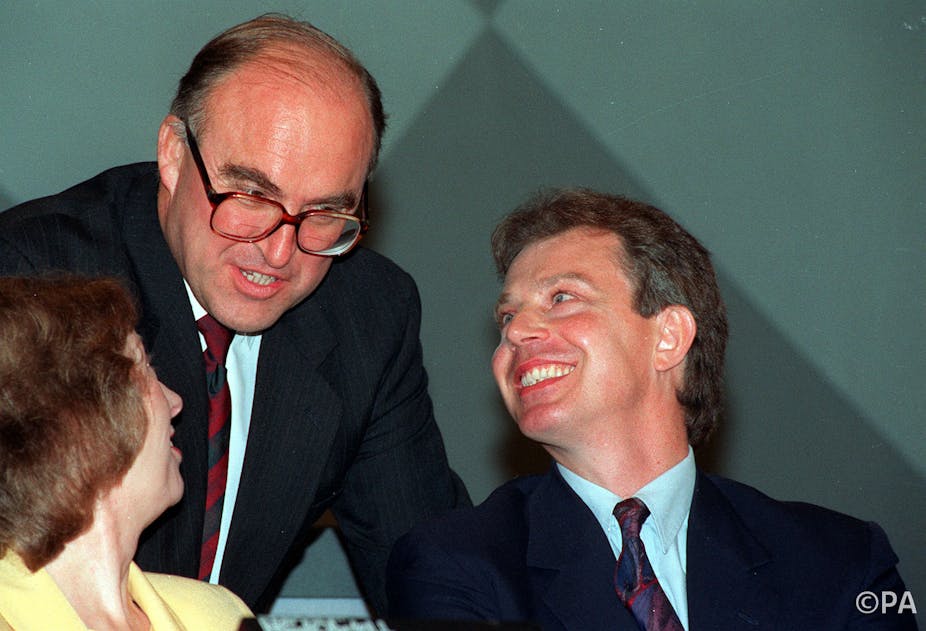It is 20 years since Tony Blair took over as leader of the Labour Party. There has been much comment about his legacy, a great deal of it uncomplimentary. But it could have been so different…
It’s the morning of July 21 1994 and after three months of speculation about whether John Smith will be fit to continue as Labour Party leader after his heart attack in May, he announces he will indeed resume as opposition leader and take his party into the next election.
Smith continues to consolidate Labour’s poll lead. He is a very different type of leader from his predecessor Neil Kinnock, who was probably a tad too brash for the British electorate; Smith is the friendly bank manager in the High Street (before, that is, bank managers became a toxic brand) and he leads a united Labour opposition.
So, after clinging on for a full five years Major goes to the polls, Smith wins with ease, presiding over a Labour majority of 150, an even bigger margin of victory than that achieved by Clement Attlee after World War II.
Smith has a strong team around him, although few members with ministerial experience, it having been 18 years since the last Labour Government. Among his impressive array of younger talent, who have proved themselves in opposition, are Gordon Brown who becomes chancellor of the exchequer, and Tony Blair, who becomes home secretary.
The Labour government of 1997 to 2001 was Smith’s great achievement. It repealed much of the social legislation passed during the years of Thatcher and Major and renationalised the rail and water industries – moves that secured enormous popular support.
Robin Cook takes over
Come the 2001 election Smith wins but is exhausted and he steps down from the leadership shortly after the poll victory. The leadership election that follows is a close-fought battle between four political heavyweights – Brown, Blair, Margaret Beckett and the foreign secretary Robin Cook.

Blair wins most votes from the MPs but the trade unions and party members vote for Cook in large numbers and he takes over as party leader and prime minister.
Cook’s first big test is whether to support the Bush administration in its plans to oust Sadam Hussein in Iraq. Cook is firm in his belief that such a measure can only be justified by a vote in the UN Security Council. No such majority is achieved and, despite extreme pressure from Washington, Cook stands firm and, with the overwhelming backing of his party in parliament, refuses to support the American action in Iraq.
The main advocate of support is the new foreign secretary Tony Blair, but he is isolated and takes defeat badly. He resigns not just from the cabinet but from the Labour whip in the House of Commons declaring: “Robin Cook has just made the worst decision in the history of British foreign policy.”
But the move is popular in the country and Cook’s position is secure. His government continues the work of Smith by introducing major reforms including closing down all the existing grammar schools, depriving private schools of their charitable status and introducing a tax on property worth over £1m.
The Cook government’s programme is popular and with the Tories in disarray – still changing their leader on an annual basis – Labour wins the 2005 election. But Cook follows Smith’s example and, having led his party to victory, steps down.
Enter David Miliband
The leadership battle that follows Cook’s resignation is essentially a two-horse race between the long-serving chancellor, Gordon Brown, and the man who Cook has surprisingly promoted to foreign secretary, David Miliband. Labour, having had two successive Scottish leaders and, perhaps seeing Brown not just as Scottish but also as tired, elect the dashing young foreign secretary to lead the party.
The leader of the defeated Tory Party, Michael Howard, steps down and in another surprise development, Tony Blair, who is no longer in the Labour Party, but has been returned to Parliament as an independent, is elected leader of the Conservative opposition.

The Labour unity that typified the Smith and Cook leadership, begins to disintegrate under Miliband. He is bright, very bright, but appears not to have neither the strategic vision, nor the political nous, to keep the good ship Labour, prone to instability, on an even keel. Backbench rebellions dog Miliband’s time as leader, while at the same time the Conservatives, now led by the canny Blair, are looking like real challengers.
The Miliband government seems to lack the vision of his predecessors and becomes mired in the economic storms unleashed by the Lehman Brothers collapse in 2007 and the subsequent economic crash in 2008. To no one’s surprise the Blair-led Tories defeat Labour in 2010 but, without an absolute majority are forced to form a coalition government with the support of the Liberal Democrats.
Miliband cannot survive the turmoil in the Labour Party, and stands down. In the leadership battle that follows, much to many observers’ surprise, his brother Ed is elected to take over. He unites the party, gives it a new sense of direction and offers the country a clear alternative to the coalition government.
He secures an outright majority in the 2015 election and the Miliband mark II government, with an overall majority in parliament, comes to power. It becomes, as is now well known, one of the most surprising governments in modern British history, but that story (with all its dramatic twists and turns) is, as they say, now history, as is Blair’s own equally surprising journey after having stepped down from the Tory leadership after his 2015 defeat.

